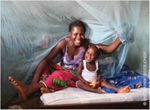UNICEF Update for TDR - World Health Organization
←
→
Page content transcription
If your browser does not render page correctly, please read the page content below
JCB42 Item 6.1 ‐ UNICEF 25‐26 June 2019
UNICEF Update for
TDR
42nd JCB
June 2019
© UNICEF/UNI197921/Schermbrucker
UNICEF Engagement
with Disease Control
• UNICEF primarily engages at response and program levels, not
clinical research, with a focus on mothers and children and
equity.
• For example in vector diseases – Zika, Yellow Fever, Malaria
• For other outbreaks – Ebola, Cholera
• For broader disease control – TB, HIV & Malaria, Pneumonia and
Diarrhoea, Newborn Sepsis, Antimicrobial Resistance, etc.
• Particularly in Outbreaks and Humanitarian Emergencies we have limited
capacity for research – We started our 1st IR in a Humanitarian Setting in
Cox’s Bazaar in 2019
1JCB42 Item 6.1 ‐ UNICEF 25‐26 June 2019
Why IR at UNICEF?
Implementation
Research at
UNICEF
Where Implementation Research fits within the
programme cycle
Management
issue
Known
solution
Evaluation
Initiation of Problem Programme
Baseline Monitoring (endline/
implementation identified changes
Unknown impact)
made
problem or
solution
Implementation
research
2JCB42 Item 6.1 ‐ UNICEF 25‐26 June 2019
Why IR at UNICEF?
Implementation
Research at
UNICEF
“There are good opportunities for integrating implementation research
into programs and their design, and in some circumstances the
research can be done in a way that can provide relatively quick
feedback loops to adjust program design in real time.”
Ted Chaiban
Director Programme Division UNICEF
Approach
Our implementation research activities are “embedded” within programmes
to better understand factors that influence and improve implementation
for health systems strengthening
Meaningful engagement/leadership by practitioner/decision‐maker
Alignment of research activities with the implementation, funding and policy
cycles, and continuity of engagement
Reduce overreliance on external consultants and rather promote local
capacity – linking capacity for implementers to local researchers
Use IR as a driver for change
3JCB42 Item 6.1 ‐ UNICEF 25‐26 June 2019
DELIR: https://sites.google.com/view/delir‐workshop‐2018/home
Some Examples: Pakistan IR: https://sites.google.com/view/pakistanirforepi/home
DELIR: http://www.who.int/alliance‐hpsr/projects/dmir/en/
Decision‐Maker Led Implementation Pakistan IR for immunization
Research (DELIR)
• Single‐country model to link better with in‐country
• 14 projects were supported in 10 Gavi priority processes focusing questions through the JA and EPI
countries: 2 rounds – 2015‐2016 & 2016‐2017 reviews and linking with GAVI support processes like HSS
and TCA.
• Topics: vaccination coverage, demand, health
and delivery systems for vaccines) • Topics: use of CHWs, polio synergy, supportive
supervision, social mobilization, governance
DELIR Data Analysis and Dissemination IR teams in Pakistan shared their results with
Workshop, Geneva, April 2018 Health Minister of Pakistan in March 2018
Challenges
• Senior leaders have sometimes needed convincing
on approach
• Challenges sometimes in aligning policy and
funding cycles with studies
• Implementers and researchers often overly
ambitious or still want to pursue traditional
research
• Teams face political, cultural and social difficulties
• Ethical approval process onerous and conflict with
aligning with cycles – Ethical Review Committees
often don’t understand IR
• Many research teams require ongoing technical
support
4JCB42 Item 6.1 ‐ UNICEF 25‐26 June 2019
Successes – Real‐Time use of Findings
• Nigeria: Integration of participatory action research approach
into existing social mobilization structures in areas with pockets
of unimmunized children. The research team developed policy
and supporting documents to guide policy makers in this effort.
• Ethiopia: Improvement of data quality and use within the
existing health information system through community
engagement. The team used their research findings to develop
guidance on the use of community health data for shared
accountability
• India: Examined how to counter anti‐vaccine propaganda lead
to a revised communication strategy, including a mobile social
media app.
Programme or policy changes/improvements are the
objective of IR
Implementation Research on Prevention of HIV transmission from Mother to Child in Malawi
Study Rationale: Implementer Question Use of Research Findings
• To assist the Malawi Ministry of Health
• From January 2018 in response, m2m
(MOH) and mothers2mothers (m2m) to
modified its intervention to include
develop adolescent‐focused PMTCT and Adolescent Champions
mentor mother programming
Study Questions
• Appropriateness & Acceptability of mentor
mother programme for adolescents mothers
living with HIV
Methods
• Qualitative Focus Groups
5 months study ‐ July protocol
development to December 2017
presentation @ ICASA
Total cost US$15,000
5JCB42 Item 6.1 ‐ UNICEF 25‐26 June 2019
“Every year, three to five thick reports with a
long list of recommendations are brought on my
table, I seldom get a chance to skim through
them, but this time, I am co‐producing the
required knowledge….”
‐Pakistan EPI manager
6JCB42 Item 6.1 ‐ UNICEF 25‐26 June 2019
Objectives of the Implementation
Research (IR) initiative Cox’s Bazaar
Identify key implementation challenges of MNCH
programmes in Cox’s Bazar (particularly for
FDMNs)
Explore potential solutions of those challenges
and ensure their utilization in the Rohingya
refugee crisis through engagement of decision‐
makers
Develop guidance on IR approach for
Emergency/Crisis Settings
Collaborators: James P Grant School of Public Health,
© UNICEF/IRDS/NYHQ2019/Shahab
BRAC University and UNICEF Regional Office South Asia,
Bangladesh Country Office and IDRS unit NYHQ
IR in Cox’s Bazar – UNICEF | for every child
Emergency situation‐magnitude of the problems have been
changing time to time along with service provision
modalities
More than 100 organizations are working with their own
objectives and priorities‐often, lack of coordination is an
issue
Context specific
UN agencies seem to play key role rather than government
challenges
‘Sustainability’ of the programmes is not the aim of GoB
Language barrier
IR in Cox’s Bazar – UNICEF | for every child
7JCB42 Item 6.1 ‐ UNICEF 25‐26 June 2019
UNICEF IR Links to TDR IR
• Co‐Sponsor Global Conference on Implementation Science, 29 June –1 July
2019, Dhaka, Bangladesh
• WHO (TDR, AHPSR, HRP) with UNICEF and World Bank on IR for UHC – Ethiopia,
Nepal and India, possible expansion to other GFF countries and joint UHC/PHC
priority countries
• Engagement with GFF/USAID Implementation Research Coalition
• IRDS Plans for 2019 to develop a roster of individual and institutional
consultants in IR – link to Sort‐IT graduates and TDR Research Hubs
• Direct linkages on AMR research
• Assuring TDR research includes children in key programmes, e.g. TB, Malaria,
AMR
• Other current areas of UNICEF IR: Immunization, GIS, Birth registration,
Maternal‐Newborn, HIV, Nutrition, Emergencies, Adolescent Health, Child
Protection Case Management
Thank You
© UNICEF/SUDA2014-XX228/Noorani
8You can also read



























































